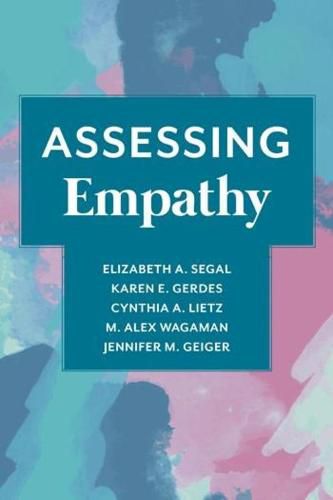Readings Newsletter
Become a Readings Member to make your shopping experience even easier.
Sign in or sign up for free!
You’re not far away from qualifying for FREE standard shipping within Australia
You’ve qualified for FREE standard shipping within Australia
The cart is loading…






Empathy is a widely used term, but it is also difficult to define. In recent years, the field of cognitive neuroscience has made impressive strides in identifying neural networks in the brain related to or triggered by empathy. Still, what exactly do we mean when we say that someone has-or lacks-empathy? How is empathy distinguished from sympathy or pity? And is society truly suffering from an empathy deficit, as some experts have charged?
In Assessing Empathy, Elizabeth A. Segal and colleagues marshal years of research to present a comprehensive definition of empathy, one that links neuroscientific evidence to human service practice. The book begins with a discussion of our current understanding of empathy in neurological, biological, and behavioral terms. The authors explain why empathy is important on both the individual and societal levels. They then introduce the concepts of interpersonal empathy and social empathy, and how these processes can interrelate or operate separately. Finally, they examine the weaknesses of extant empathy assessments before introducing three new, validated measures: the Empathy Assessment Index, the Social Empathy Index, and the Interpersonal and Social Empathy Index.
$9.00 standard shipping within Australia
FREE standard shipping within Australia for orders over $100.00
Express & International shipping calculated at checkout
Empathy is a widely used term, but it is also difficult to define. In recent years, the field of cognitive neuroscience has made impressive strides in identifying neural networks in the brain related to or triggered by empathy. Still, what exactly do we mean when we say that someone has-or lacks-empathy? How is empathy distinguished from sympathy or pity? And is society truly suffering from an empathy deficit, as some experts have charged?
In Assessing Empathy, Elizabeth A. Segal and colleagues marshal years of research to present a comprehensive definition of empathy, one that links neuroscientific evidence to human service practice. The book begins with a discussion of our current understanding of empathy in neurological, biological, and behavioral terms. The authors explain why empathy is important on both the individual and societal levels. They then introduce the concepts of interpersonal empathy and social empathy, and how these processes can interrelate or operate separately. Finally, they examine the weaknesses of extant empathy assessments before introducing three new, validated measures: the Empathy Assessment Index, the Social Empathy Index, and the Interpersonal and Social Empathy Index.